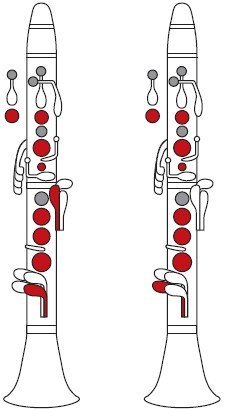Introduction to the B Minor Pentatonic Scale
When you think of the clarinet, what melodies pop into your head? Now let's add a twist: what if we look at those melodies through the lens of the B Minor Pentatonic Scale? This scale has a fascinating history, especially within the clarinet community. Musicians and enthusiasts, whether you're a professional player or just starting, will find the nuances of this scale absolutely riveting!

Clarinet Fingering Charts are always FREE at MartinFreres.net!
The Composition of the B Minor Pentatonic Scale
The B Minor Pentatonic Scale is a five-note wonder that packs a punch. It's composed of the notes B, D, E, F#, and A. Simple? Yes! But it's got a rich background and has made waves through various musical genres. The beauty of this scale lies in its versatility across different musical styles. From the soulful strains of jazz to the vibrant sounds of folk music, the B Minor Pentatonic Scale adds depth and texture to clarinet music.
Historical Significance in Jazz and Classical Music
Clarinetists have long used the B Minor Pentatonic Scale to evoke emotions. Jazz clarinetists, for example, embraced this scale during the genre's boom in the early 20th century. It provided a framework for improvisation while offering a structure that keeps musicians grounded. Listen closely, and you'll hear how these five notes dance around melody and harmony. It's truly captivating!
In the classical world, the scale also made its mark. Romantic composers often ventured beyond diatonic scales, exploring new colors in their compositions. The B Minor Pentatonic Scale found its way into various works, adding expressive textures to clarinet concertos and chamber pieces. It's particularly effective in creating a sense of longing or nostalgia.
Benny Goodman: King of Swing and the Pentatonic Scale
One notable figure in this musical journey is the renowned clarinetist, Benny Goodman. Known as the “King of Swing,” Goodman frequently incorporated this scale in his performances. His skillful use of the scale captivated audiences and helped shape the swing movement. Listening to his pieces is like exploring a musical landscape where the B Minor Pentatonic serves as a familiar guide.
| Aspect | Significance in Clarinet Music |
|---|---|
| Jazz | Provides framework for improvisation |
| Classical | Adds expressive textures to compositions |
| Swing | Shaped the movement through Benny Goodman's influence |
Cultural Context and Roots
Here's an interesting fact: this scale isn't just about the notes; it's steeped in cultural context. The B Minor Pentatonic's roots can be traced back to various musical traditions, including African music, which uses pentatonic scales to create complex rhythm and harmony. As it made its way into clarinet music, it brought these rich cultural backgrounds along. It's like a musical bridge between cultures!
Pedagogical Importance
For new clarinetists, the B Minor Pentatonic Scale is often one of the first scales introduced. Its simplicity makes it easy for beginners to grasp, serving as a foundation for more complex musical concepts. It's comparable to learning the alphabet before writing full sentences!
Relevance in Modern Performances
In today's music scene, this scale remains as relevant as ever. With musicians increasingly blending genres, the B Minor Pentatonic Scale has become a versatile tool for exploration. Clarinetists are pushing boundaries and experimenting with different styles. Imagine a vibrant fusion concert where classical precision meets jazz spontaneity. This scale proves that music knows no bounds!
Conclusion
The B Minor Pentatonic Scale holds a special place in clarinet history. Its significance continues to evolve, offering insights into the connections between musical traditions. This five-note scale shows that simplicity can spark boundless creativity, emotion, and expression. Next time you play your clarinet, remember the rich legacy of the B Minor Pentatonic Scale and how it opens doors across musical genres and generations. Keep playing and exploring!
Table of Contents
- Introduction to the B Minor Pentatonic Scale
- The Composition of the B Minor Pentatonic Scale
- Historical Significance in Jazz and Classical Music
- Benny Goodman: King of Swing and the Pentatonic Scale
- Cultural Context and Roots
- Pedagogical Importance
- Relevance in Modern Performances
- Conclusion








